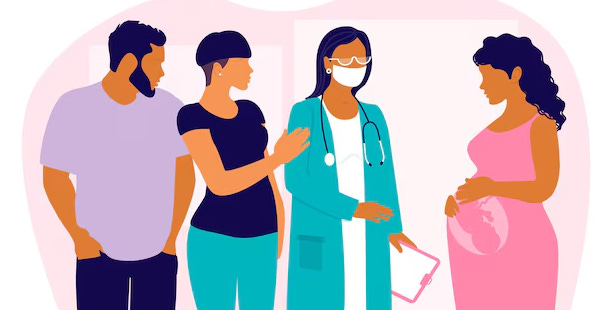Compassion Burnout is Real (and Here’s How to Avoid It)
perspectives, tips and a quick read to kickstart your 2025 on a healthy note
The new year invariably brings hope, positivity, and the freshness that new beginnings need. In this edition, we want to celebrate that spirit and help you embrace a fresh start—one that keeps burnout at a distance. Here's to a year of renewed energy and balance!
You’re great at juggling a thousand things at once. Between patient consults, emergency C-sections, and that one patient who insists on asking Google about every symptom, it’s no wonder you sometimes feel like you’re running on fumes. But let’s talk about something even the best OB-GYNs often brush aside – compassion burnout.
Yes, It’s a Thing. And It’s Coming for You.
The world expects gynaecologists to be nurturing, empathetic, and ready with answers at all hours. That’s the job, right? But constantly pouring energy into others can leave your own cup bone dry. Compassion burnout is like regular burnout’s annoying cousin – except it specifically targets your empathy.
Imagine caring so much for patients that their trauma starts to seep into your personal life. That’s compassion burnout, sometimes called secondary traumatic stress. It’s common in professions that demand high emotional labour, and gynaecology is front and centre.
The Indian (and Global) Scenario
Globally, burnout among healthcare professionals is a raging fire. A study by the Indian Journal of Psychiatry found that 45% of doctors in India experience burnout, with women disproportionately affected (shoutout to gynecs). This aligns with findings in the BMJ, which reported 44% of healthcare workers in South Asia suffer from work-related anxiety and exhaustion. Not the kind of numbers we want to win at, right?
And it’s not just us. A 2023 survey by Medscape revealed that 47% of US physicians report symptoms of burnout, with OB-GYNs ranking among the top five specialties affected. It’s a global pattern with local repercussions.
The Signs You’re Running Empty
Burnout doesn’t hit like a lightning bolt. It creeps. Some tell-tale signs:
Feeling detached or emotionally numb during patient interactions.
Struggling to find joy in work (even with successful deliveries).
Trouble sleeping or experiencing anxiety about work.
Constant fatigue, regardless of how much you sleep.
Irritability (like snapping at that one colleague who takes forever to return instruments).
Sound familiar? It’s not weakness; it’s biology.
Steering Clear
(Without Booking a One-Way Ticket to Goa)
1. Embrace Boundaries – Seriously.
Compassion doesn’t mean 24/7 availability. Start small: don’t check WhatsApp after clinic hours. Remember, boundaries aren’t neglect – they’re survival tools.
2. Tag-Team with Colleagues
You’re not a one-person army. Lean on your team. Share responsibilities, conduct patient debriefs together, and normalize asking for backup when needed. Even the best surgeons need assistants.
3. Find a Professional Squad
Form (or join) a community of fellow gynecs. A monthly meet-up or even a WhatsApp group dedicated to venting and sharing can keep the load lighter. Dr. Heidi Allespach from the University of Miami points out that support groups are game-changers for recognizing and mitigating burnout.
4. Self-Care is Not Overrated
Whether it’s yoga, Zumba, or binge-watching your favorite K-drama, find what unwinds you and do it unapologetically. Patients benefit from a refreshed doctor.
5. Educate Yourself on Compassion Fatigue
There’s no shame in Googling (for yourself, this time). Understanding the triggers and symptoms makes you better equipped to tackle them head-on. Hospitals and clinics are slowly introducing programs focused on compassion fatigue, and if yours hasn’t yet, advocate for it.
Hospital Admins, This One’s for You
While individual coping mechanisms help, hospital policies and leadership play a huge role. Hospitals that prioritize staff well-being (through regular debriefs, peer counselling, and fatigue education programs) report significantly lower turnover and higher job satisfaction (American Psychological Association).
Indian hospitals are catching on – Apollo and Fortis have launched mental health initiatives aimed at supporting their healthcare staff. It’s about time more hospitals follow suit.
Start this year with maybe not with a bang but with a conscious kickback and relaxing session just for yourself. Take care of yourself as fiercely as you care for your patients.
Now go book that spa day. STAT!
P.S. Have a question or need specific resources? Write to us at publications@mayflowerhospital.com. We always love hearing from our readers.
Endometriosis Weekly Update —
Endometriosis 2025: What’s Coming?
From rising incidence rates and new imaging techniques to AI-assisted surgeries and cutting-edge therapies – we’re diving into what lies ahead for endometriosis care.
Catch all these bold predictions of 2025 here
Master Endometriosis Surgery with Mayflower – CSEEMIG Batch 13
📅 _January 21-24, 2025
📍 Mayflower Women's Hospital, Ahmedabad
Batch13 Jan25 (1)
Mayflower’s record in endometriosis care speaks for itself – a recurrence rate of less than 2%, far below the global average of 20-40%. This consistency is no accident.
The institute opens its doors once again, offering an opportunity to witness the approach that has set this standard.
Observe Dr. Sanjay Patel, Dr Smeet Patel and the iconic Mayflower Endo Team perform live surgeries featuring advanced techniques like the Butterfly Peritonectomy and Rule of M.
Gain insight through case discussions, Q&A sessions, and shared experiences with peers.
Registration and Payment:
Register here: https://membership.iageonline.com/Course_Home.aspx
Pay here: https://drive.google.com/file/d/1P9vyRlvly0xNI_kO6qwWdmKt4F38Ltyj/view
Thanks for reading Pollen by Mayflower! If you liked what you read and would like to read more of it, please subscribe and receive regular updates from Mayflower.
And if you think a friend would love to read this, feel free to share it with them too. We’d appreciate it :)










